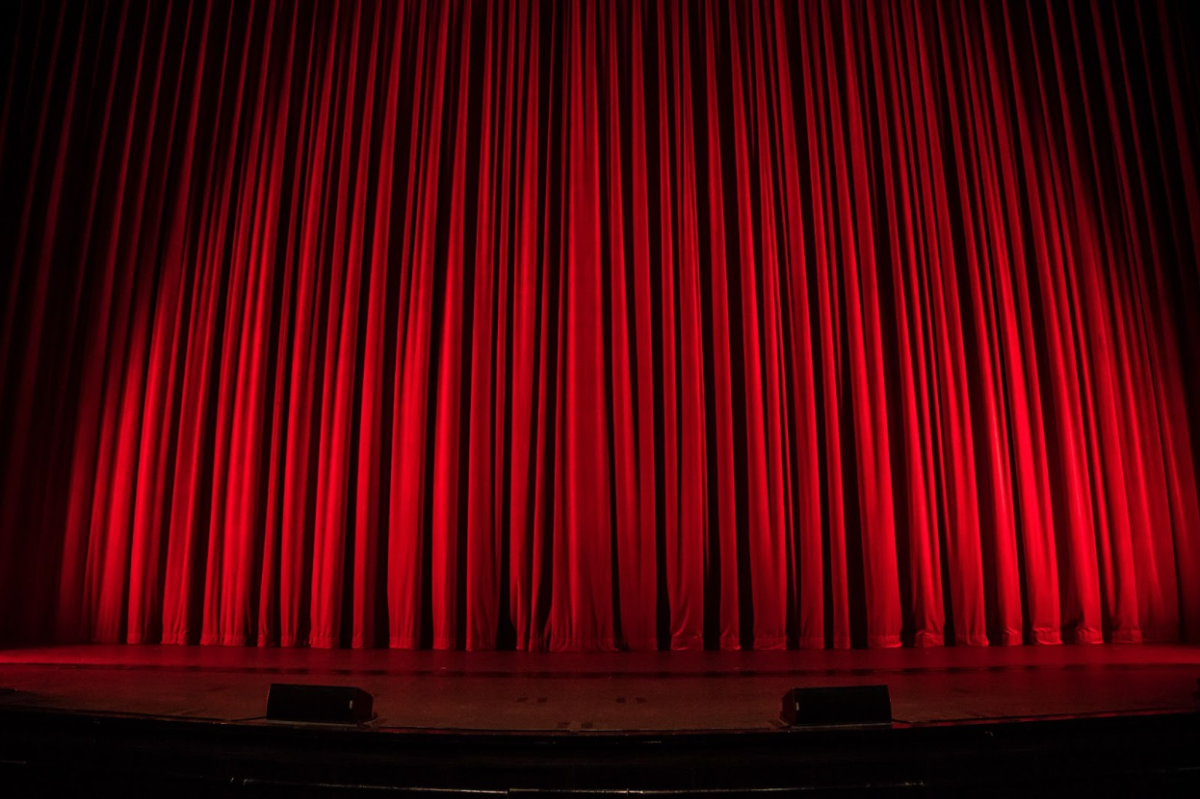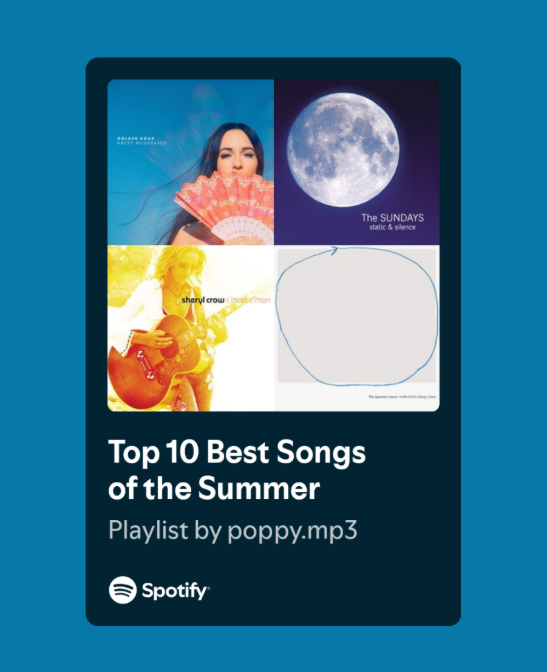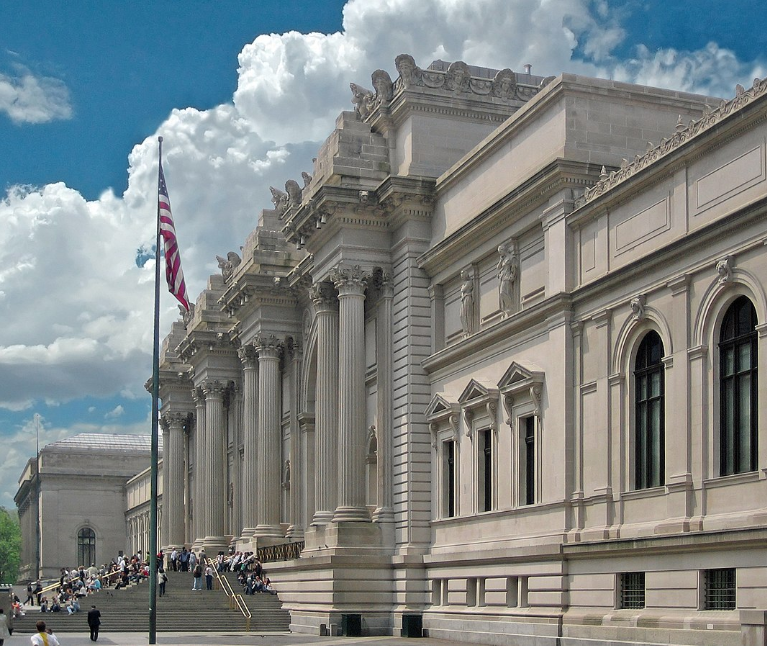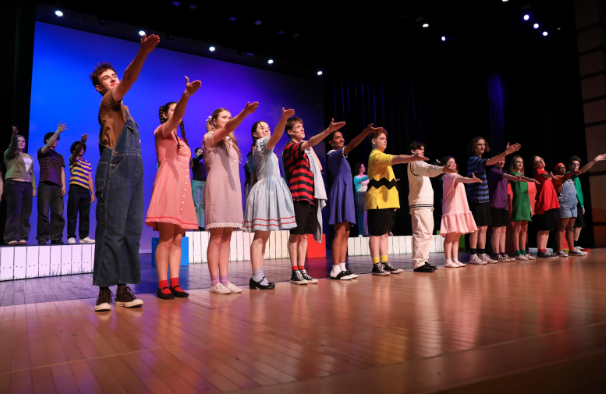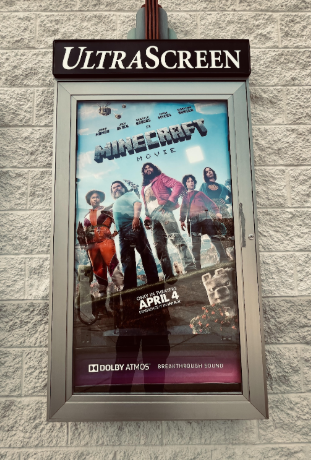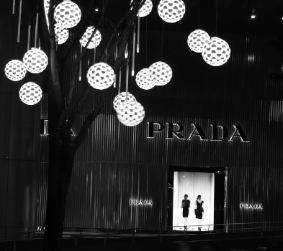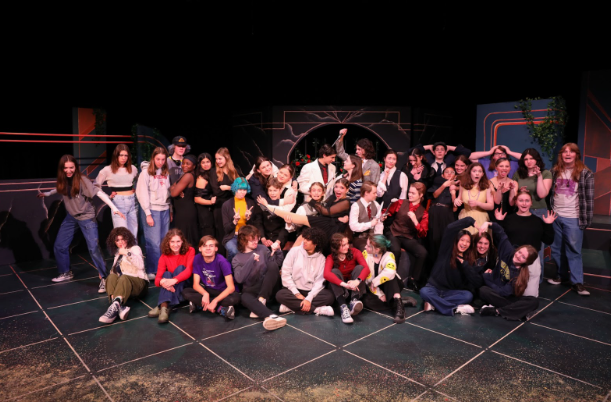A French horn player performed on the stage. A horn concerto, you ask? No, rather the first movement of Sibelius’s Violin Concerto in D Minor, Op. 47. Though the ranges and pitches were awkward to express on an instrument not made for the rigorously technical passages of the violin concerto, the horn player stood confidently in front of the sea of people to play his heart out. And why shouldn’t he? He knew that his fellow musicians in the audience and greater school community would be overjoyed, entertained and proud of his performance. He was one of Middleton High School’s (MHS) 2023 Concerto-Aria Competition winners and also performed this solo at 2023 Fine Arts Week (FAW).
On Tuesday, Jan. 26, 2024, from 6:00 to 8:40 p.m., 26 MHS student musicians performed at the 2024 Concerto-Aria Competition. The winners would get to perform in FAW, as well as have the opportunity to play with the full symphony orchestra at their winter concert on Feb. 29th. Honorable mentions would also get to perform for their peers during FAW.
On the stages of MHS’ Performing Arts Center and Black Box Theatres sat this year’s four judges: Annelisa Guries (Local Violinist and Luthier), Chris Ewan (Local String Bassist), Mike Forbes (Leader of Isthmus Brass) and James Waldo (Cello Professor at the University of Wisconsin-Madison).
Music connects communities. People of all ages, identities and life journeys come together not only to play and rehearse, but also to smile and converse with each other, expanding the intertwined circles of the musical communities in and outside of MHS. I was honored to interview this year’s winners of the Concerto-Aria Competition about their experiences. What they told me not only proved how special the MHS music community is, but also inspired me as a fellow musician. The 2024 winners and fellow participants proved their crucial roles in their community by displaying their exceptional talents.
Without any further ado, here are the 2024 MHS Concerto-Aria Winners and Honorable Mentions!
The following interviews have been edited and condensed.
Winners
Indre Raghavan
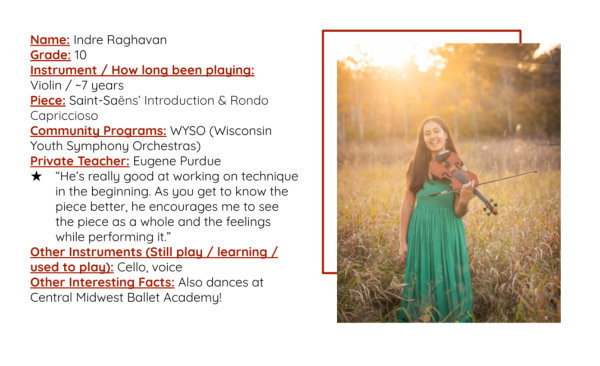
Q&A:
E: How were you feeling after the performance?
I: I thought I did really bad, actually. I was just glad that I got it over with… I was just glad that I did it because whatever happened, I was glad to have a performance opportunity to practice it.
E: What were your feelings and reactions when you found out you won?
I: Well, I actually didn’t know [that I’d won]. So, I was coming back from one of my classes and my friend was like: ‘Congratulations!’ and I was like: “On what?”. And she was like: “You won!” and I was like: “Oh, that’s funny.” I mean, I was surprised because I thought I did awful.
E: Any shoutouts to specific people who you want to thank for your accomplishments?
I: I want to thank my mom. She’s always been my practice parent when I was in Suzuki… I get distracted very easily so she’s good at keeping me on track and driving me to my lessons. And also my teacher. He’s been really, really supportive and has a really positive outlook on everything.
E: How do you feel when you play music? And are there more reasons why music is important to you?
I: Music is a different way to express myself without words and going so in depth in something every day. You can make music with anything and being part of that community and just sharing the joy brings people so much happiness.
E: What are your future prospects with music or, more specifically, violin?
I: I honestly don’t really know. I’m thinking of applying to conservatories because I love music but I don’t know if that’s going to happen. I have always loved music and wanted to [pursue] it. It’s just that I don’t know if that’s the type of life that I would be fulfilled with… I guess sooner than college, I’ll be going to summer music camps.
E: What piece of advice would you give to everyone, including non-musicians?
I: If you’re going to do something, find something that you truly like. Because I feel like a lot of the time, if you’re forced to do something, you won’t be able to put your whole heart and soul into it. And I feel that if you find something you truly like, then you’re always going to be putting your best foot forward no matter what.
Joseph Lee
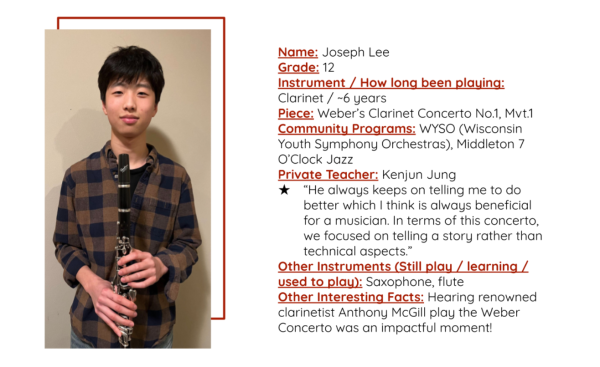
Q&A:
Eunice: Your win now marks the fourth competition in a row that has featured a clarinetist. How do you feel about this?
Joseph: Listening to the seniors was very helpful to me as a [then-junior]. And they served as inspiration for me to practice more. I remember [that during] sophomore year I was practicing maybe once a week, an hour before my lesson. And then I saw this clarinetist win the competition and I was like: “Wow, I need to start practicing more to be like them.” So I started practicing more and they served as inspiration.
E: How do you feel when you play music? And are there more reasons why music is important to you?
J: I usually hear a lot of people talk about losing themselves in music; I feel like I haven’t lost myself in music yet. But whenever I play music, it’s like [I’m] drawing something. [I’m] always trying to improve upon it and trying to create a final art piece… And my dad, he’s an artist himself so he relates everything he talks about to art and I think he instilled this feeling [in me] and that’s the thing I think about most when I listen to music… And my teacher’s always advocating for me to make people feel whenever I play music, so that’s why I like to play music.
E: What are your future prospects with music or more specifically, clarinet?
J: While I won’t be majoring in music, I hope to still be able to perform for others by joining community ensembles. On top of that, I found that teaching others is also really fun, so I hope to do that sometime in the future.
E: What piece of advice would you give to future competitors?
J: Practice a lot and practice [slowly]. That’s probably the number one thing.
E: How do you think the music community has helped you?
J: I think one of them was when Anthony McGill played with the UW Orchestra. So, that event alone. And he also played the same piece that I played. So listening to him and hearing his tone in real life was a pretty big moment.
E: What do you think your role is as a member of the musical community?
J: More beyond playing the music, it’s also helping underclassmen to grow into better musicians… I think that’s always the goal: furthering their [musical] capabilities.
Juliette Mandelbrot
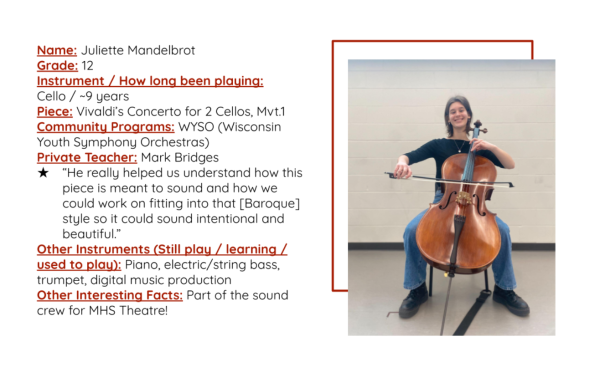
Q&A:
Eunice: How were you feeling before the performance?
Juliette: I was very excited. I really like performing and it’s less stressful to perform with someone else than it is to play a solo.
E: What were your feelings and reactions when you found out you won?
J: I went into the orchestra room and checked [the results] and I was like: “Wow. This is really surprising.” Shock was definitely my initial reaction; the happiness came a little later when I realized that I could perform with everyone at the concert and Fine Arts Week. I think you always have high hopes but try to keep low expectations because you want to be happy either way. And I think even getting a chance to perform it was fun. And I got feedback which is really helpful.
E: What are some similarities and differences that you noticed as a co-performer compared to performing solo?
J: When you’re a soloist, you always have this idea of playing with a soloistic sound. And this is still true for double concertos but I think that there’s a bit more of: “I’m going to step back in this part to let the other person play out the interesting part.” And I think a lot of that depends on really active listening and understanding the other part. I think that provides a really unique opportunity to understand the other parts and how they combine, which is different from a solo and I find it really fun. It’s a new experience. It’s like chamber music but there’s only one other person so you get to be more in-tune with them.
E: How are you feeling about playing with the orchestra?
J: I’m very excited. As an actor, I love performing; it’s very exhilarating for me. And I tend to be more excited than nervous. So I’m just very excited and I’m really motivated to work hard and practice so it can sound even better at the performance than it did at our audition.
E: Any shoutouts to specific people you want to thank for your accomplishment?
J: Eunice, my fellow cellist! You were the one who asked me to play a double concerto with you so I wouldn’t have had the opportunity to play this without you. And, of course, our accompanist Vince; I’ve worked with him a lot and I think he is really helpful, not only in making us stick together but also [in] giving us musical advice. And my teacher Mark for also giving us advice and being very encouraging. And Mr. Kurr. Mr. Kurr is the best… he was always very encouraging and was very excited when we told him that we were going to be performing a piece with only a string orchestra. He’s always been very funny and [keeps] things lighthearted.
I remember that at last year’s concerto competition, Mr. Kurr misspelled my last name in the audition time lineup by leaving out the “N.” But then, about 10 minutes before my performance, he comes to me and hands me a slip of paper with an “N” on it. And he was like: “Here’s your ‘N’ back.” And after he explained it to me, I was laughing my head off. And the thing is, I was supposed to be stressed for my performance but he [had] me laughing… I still think about that; I still have the “N” in my cello case. Whenever I [had] a competition, I would pull it out a little and it would lighten my mood. Another person [I’d like to thank] is Jacob for being my predecessor… My best friend and brother, Jacob, who also performed through the concerto competition and really inspired me to perform myself. And I was really excited when I got to play with him when he was soloing and I hoped that one day I would be up on that stage!
E: How do you feel when you play music? And are there more reasons why music is important to you?
J: Music is very freeing. It’s not restrictive in that you don’t get graded every time you practice and even though there are auditions, I really try to have a mindset of: “I’m happy to be performing in the moment,” whether it’s me performing at an audition or whether I’m performing for an actual performance. Like: “this is what I do for fun.” I willingly choose to practice an hour of music every night because I like it. It’s not because I’m being forced; I just really love the music I play and the people I get to be around when I’m playing.
E: What are your future prospects with music or, more specifically, cello?
J: I do not want to stop playing cello. I want to play it for the rest of my life. In the near future, I definitely want to play in my college orchestra. I might explore playing in a pit orchestra for theatre and combining my theatre and cello knowledge. And I also want to keep playing chamber music… I just want to experiment with joining different groups in college. I don’t think I’ll minor or major in music, though I’ll probably take some composition classes and cello lessons. I still want to always be able to play. I want to keep my cello with me. I want to practice often enough [so] I can just have fun, enjoy playing and never let it leave my life. And I also want to keep going to concerts because I love concerts and want to keep experiencing high-quality classical music performances! I want to keep being involved in the arts and my passion won’t go away.
E: What piece of advice would you give to future competitors?
J: Be confident and excited to be there. Try to have a stage presence. Even if you are nervous about something, try not to show it on your face. The judges don’t want you to fail– they want you to do well. So don’t think of it as a competition where you’re trying to beat the judges’ game… just try to share your music and it’ll show. And I really do think that competitions are not the end of the world and if you want to do well, of course you have to practice and prepare, but have fun, do your best and show them what you can do.
E: What piece of advice would you give to everyone, including non-musicians?
J: Come see our concerts and shows! Middleton has an amazing arts program. Just come and support us! [Us] students, we work almost every day to create something that we can share with you, so stop by and see us. And if you’re a musician, participate as much as you can. Have fun playing with other people and do what makes you happy.
Eunice Chung
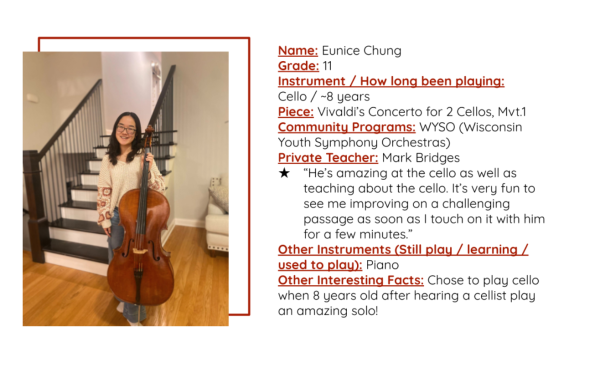
Ethan Bo
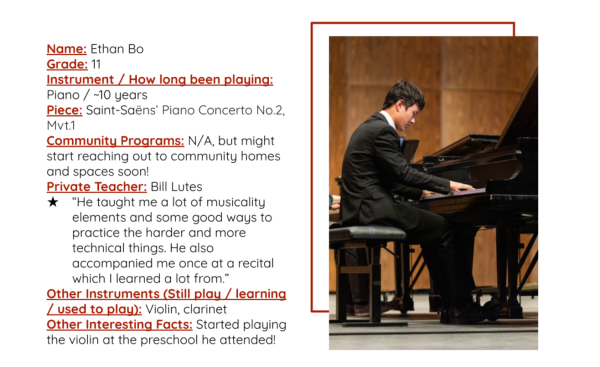
Q&A:
Eunice: How were you feeling after the performance?
Ethan: It’s always fun to perform for me. The performance anxiety is definitely there but when I’m sitting down, I just let it go. Whatever happens, happens. My mom’s out there and she always enjoys it so that’s all that really matters to me. There weren’t that many people in the audience but I just felt relieved that it was finally over.
Eu: You were also selected as one of the winners for the Middleton Community Orchestra Young Artist Competition. Congratulations! How did the experiences compare and have you gained any insight from playing so many competitions?
Et: Thank you! The Middleton Community Orchestra competition was located at Capitol Lakes and that’s where my piano teacher holds all of his recitals… Honestly, I was just very loose that day. I went up there and played and apparently, I sounded really good.
Musical competitions are so subjective. You could win [one] competition and get nothing in the next competition. It really depends on the judges and how you play that day. So musical competitions are kind of flawed. You need to have some way of judging but in the end, everyone’s put in the work and everyone expressed themselves. I think it’s good to put yourself out there, to experience anxiety and be able to prepare something that’s really big. And music can be related to all aspects of our lives. For example, procrastination. In a music competition, you can’t just do last minute practice… you’ve really got to space it out over a long duration of time.
When you make a mistake, you just keep on going. Sometimes people stop because they mess up but I’ve gained the insight to just finish it and get in the zone of trying to connect with your audience. Don’t worry about the competition. Don’t worry about the judges. Try to connect with your audience.
Eu: How do you feel when you play music? And are there more reasons why music is important to you?
Et: Music serves a lot of different functions in my life. I feel like if I didn’t play piano or violin, I honestly wouldn’t know what to do with my time so it provides that rigor. When I sit down at the piano, I try to let go of everything that’s around me. A lot of the time, things happen in life and you don’t really want to think about it; music is an outlet for me to let go and have that negative emotion come out in a positive way. Also, it’s fun to play music. In the orchestra, you get to communicate with everybody through nature’s language.
Eu: What are your future prospects with music or, more specifically, piano?
Et: I think I want to play piano for the rest of my life and for my kids! [I] just probably won’t major in it or practice as much as I am right now.
Eu: What piece of advice would you give to future competitors?
Et: Don’t be discouraged if you don’t win. Especially at Middleton, there are so many accomplished musicians and it’s not about who’s better than the other person. It’s more about if the other person had a better day or if the judges felt more compelled [to some parts of the pieces]. So, don’t give up. Also, you should play music for your own sake. You shouldn’t play just to please a judge or please somebody else. You should gain that real joy from practicing. Practicing is tiring but afterwards, when you’re able to compile that piece together and perform, it’s rewarding.
Eu: What piece of advice would you give to everyone, including non-musicians?
Et: Set big goals for yourself. You want to venture out into the unknown and you want to take risks, although they’ve got to be calculated. When you’re preparing for a competition, you [begin] months in advance. You get this big piece and think: “I can’t do this. This is so hard.” But part of you is like: “I can do it.” And you’ve got to listen to that part of you because deep down, you know that you can. So you’ve got to believe but also put in the work. That’s why music is good. For anything you want to do in life, it’s a journey. There are going to be ups and downs. Sometimes after a practice session, I get worse which is really frustrating. But those small hurdles are important in all aspects of life. So I really think music is an integral part. You don’t have to play music but a lot of the life lessons you learn from music are super applicable [elsewhere].
Eu: What do you think your role is as a member of the musical community?
Et: To contribute to the larger musical community and also to be inspired by others as well as to inspire. It’s important to learn from others but to also teach people and give back. I feel like I could do more of that, especially at our school orchestra. I just don’t want to come across as a person that’s too egotistical. But I think it’s really important to let go of your ego. If you lose, you lose and we have to accept it. Because if you create too big of an ego, it’s just all going to tumble down on you and it’s not going to be good, especially because the world is a lot bigger than I perceive it to be… So I think it’s just really important for me to not look at my pride too much, just because you can have accomplishments and failures and those just make you a better person.
Eu: Any other comments?
Et: Honestly, I’m just excited to be able to perform at Fine Arts Week again!
Honorable Mentions: Pavil Jones (10th grade, piano), Alexa Garber (12th grade, dance), Juliette Mandelbrot (12th grade, cello), Linus Ballard (11th grade, voice), Vivian Feng (ninth grade, piano), Rhea Dalvie (12th grade, viola)
Our school’s music wing was most likely built separate from the rest of the school by two pairs of heavy doors to prevent sound from escaping and disturbing academic classrooms. However, when a musician steps into the wing, it’s not just an enclosed area, but a safe space. Hearing the scales produced by harmonious voices from the choir room, the lively melody of a jaunty tune from the orchestra room, the bone-thundering proclamations of a march from the band room or a pianist thundering the black and white keys with intensity from a practice room are all what make the secluded music wing what it is.
Each and every single musician is a part of this immersive and interconnected society of music, giving unlimited amounts of support and passion to each other. This community has largely shaped our MHS musicians, including the exemplary performers mentioned above and has now become a part of their identities.
The music community is more, so please, give us more.
Again, the loudest, most enthusiastic congratulations for the names above! The MHS community is exceptionally proud of you!



